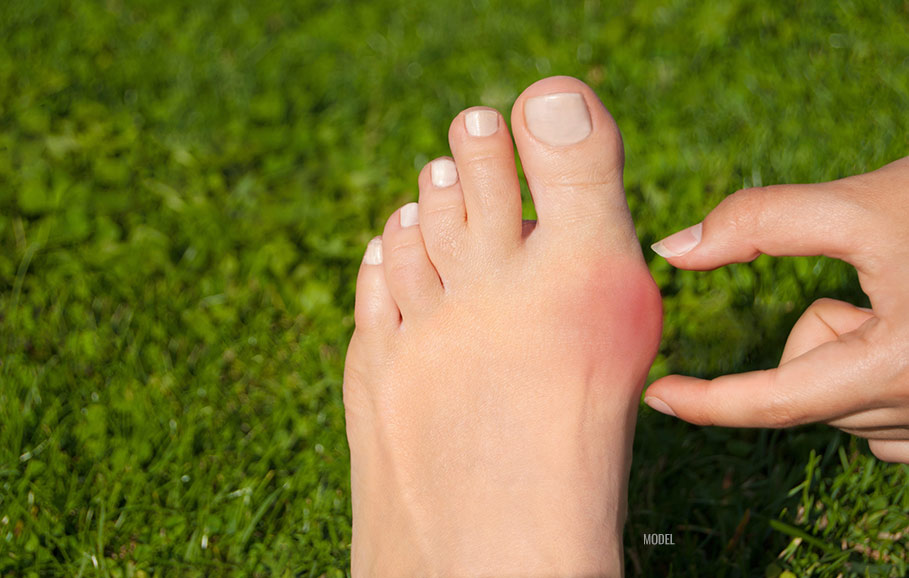Can You Fix Bunions Without Surgery?
Posted April 01, 2024 in Bunion Pain

Bunions can cause aesthetic and physical issues, limit mobility in the feet, and eventually cause arthritis. This blog will discuss how bunions are formed, who is susceptible to developing bunions, and what options are available for non-surgical treatment.
4 Min Read:
How Common Are Bunions?
If you’re like most New Yorkers, you probably do a lot of walking in your day-to-day and likely take for granted your ability to do so comfortably. Without the right supportive shoes, you may be developing a very common (yet painful!) foot problem: bunions.
While minor cases are generally treatable with non-surgical methods, leaving a bunion untreated can result in long-term issues that can only be solved with surgery. Below, we will discuss what you can do to prevent bunions from forming and what options you have that don’t involve invasive surgery.
How Do You Know You Have Bunions?
Bunions are the result of a misaligned first metatarsal-phalangeal (first MTP) joint at the base of the big toe. It often looks like a bump on the side of the foot, below the big toe, and can cause physical discomfort that progressively worsens over time.
One of the most obvious signs that you have bunions is a large, protruding bump on the side of your foot. Other signs of bunions include:
- Pain or swelling around the base of the big toe
- Redness around the big toe
- Corns or calluses where the big toe rubs against the second toe
- Limited mobility in the big toe
You may not realize that you are developing a bunion. This is because you might not be experiencing pain, but the following causes of bunions can help determine if you are susceptible to them.
Common Causes of Bunions
Some people are more likely to develop bunions due to genetics or lifestyle factors, so understanding the causes can help prevent or minimize their risk and prevent bunions from getting worse.
Bunions can be caused by:
- Tight or narrow shoes (especially high heels)
- The shape of your foot
- Flattened feet
- Arthritis or other medical conditions
How Are Bunions Treated?
If you think you may have a bunion, the first step is to schedule an appointment with your New York City podiatrist. Leaving your bunion for too long can result in a rapid progression of the condition and, eventually, a loss of mobility in the feet with difficulty walking and debilitating arthritis.
At Chelsea Foot and Ankle, our expert podiatrists take their time with each patient to deliver careful and accurate diagnoses for a wide range of foot and ankle problems, including bunion treatment.
Generally, bunion treatment will fall under two categories: surgical and non-surgical, (also known as conservative treatment) to take care of the problem.
Bunion Surgery
In more severe cases, your podiatrist may recommend bunion removal surgery or a bunionectomy. A bunionectomy is usually an outpatient procedure using local anesthesia, so there is no need for a hospital stay.
However, recovery can take some time, and most patients want to avoid undergoing invasive surgery. Our podiatrists agree that surgery should be a last resort for most patients and will always take a conservative route when possible.
How to Treat Bunions Without Surgery
If you’d like to avoid surgery and the recovery period that follows, you have a few options for treating your bunions non-surgically.
As bunions progress, they push the big toe out of alignment and toward the second toe. Eventually, it can drift underneath the second toe and cause it to shift towards the third toe.
In early cases, bunions can be treated merely with protective pads that cushion the joint and a switch to more comfortable shoes that allow the joints to relax.
Custom orthotics from Chelsea Foot and Ankle can correct some common causes of bunions, such as the over-flattening of the foot, and help realign the front of the foot so that the big toe can function correctly.
Even inflamed bunions do not automatically mean a person will have to undergo surgery; at Chelsea Foot and Ankle, we understand how debilitating it is to live with foot pain, as well as how unappealing a lengthy recovery can be. That’s why we always strive to provide non-surgical options to get you back on your feet and comfortable.
Interested in Non-surgical Bunion Treatment in New York City?
For conservative bunion treatments, expert diagnostics, and boutique service, call Chelsea Foot and Ankle today at (646) 929-4149 or fill out our online contact form to get started.
